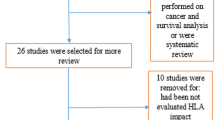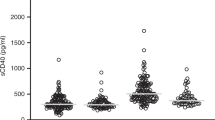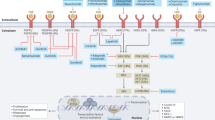Abstract
Among gastric cancer patients, the Rhesus D-negative phenotype correlated with increased tumour recurrence [all patients, n = 83, P = 0.026; curatively (R0) resected patients, n = 51, P = 0.093] and reduced overall survival time (all patients, log-rank P = 0.0028; R0 patients, log-rank P = 0.0003) and was identified in multivariate analysis as the most important independent prognostic marker in the R0 patient group (relative risk 9.1, P = 0.0013).
This is a preview of subscription content, access via your institution
Access options
Subscribe to this journal
Receive 24 print issues and online access
$259.00 per year
only $10.79 per issue
Buy this article
- Purchase on Springer Link
- Instant access to full article PDF
Prices may be subject to local taxes which are calculated during checkout
Similar content being viewed by others
Author information
Authors and Affiliations
Rights and permissions
About this article
Cite this article
Mayer, B., Schraut, W., Funke, I. et al. The Rhesus D-negative phenotype is an independent predictor of poor prognosis in curatively (RO) resected gastric cancer patients. Br J Cancer 75, 1291–1294 (1997). https://doi.org/10.1038/bjc.1997.219
Issue Date:
DOI: https://doi.org/10.1038/bjc.1997.219



